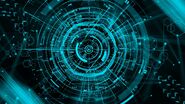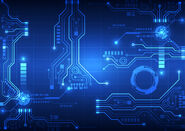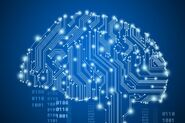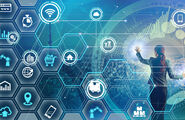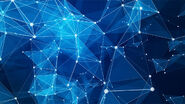The Abstract Tech aesthetic consists of design motifs, such as concentric arcs, hexagons, or circuit patterns, that are intended to evoke a sense of something being futuristic or technologically advanced in the 21st century or Digital Age.
This aesthetic can be found in interfaces, depictions of cyberspace, and other technological imagery in 21st-century science fiction media, such as the JARVIS interface from Iron Man (2008) or the Grid in TRON: Legacy (2010), as well as stock images and backgrounds/wallpapers related to keywords like "technology," "high-tech," "digital," or "cyber."
Visuals
Abstract design motifs often described as "high-tech" include:
- Glowing lines, usually blue or white (or glowing blue backgrounds)
- Transparent or holographic touchscreen interfaces
- Segmented concentric arcs and circles of varying thicknesses
- Hexagons, a simple, yet advanced and efficient shape
- Printed circuit board patterns, found in most electronic devices
- Binary numbers, the basis of most digital signals and data
- Dots connected by lines, representing the Internet or connectivity
- Concepts of robots or robotic body parts
Symbols such as locks (representing cybersecurity) or the shape of a brain (representing artificial intelligence) may be combined with the aforementioned motifs as well. The use of technology in business may be portrayed as a businessperson tapping a floating touchscreen with the associated design elements.
Graphical user interfaces like these only appear in science fiction, stock images, or in user-customized desktop skins and widgets using software such as Rainmeter. Most default GUIs of today tend to lean more towards the Cyber Minimalism aesthetic.


